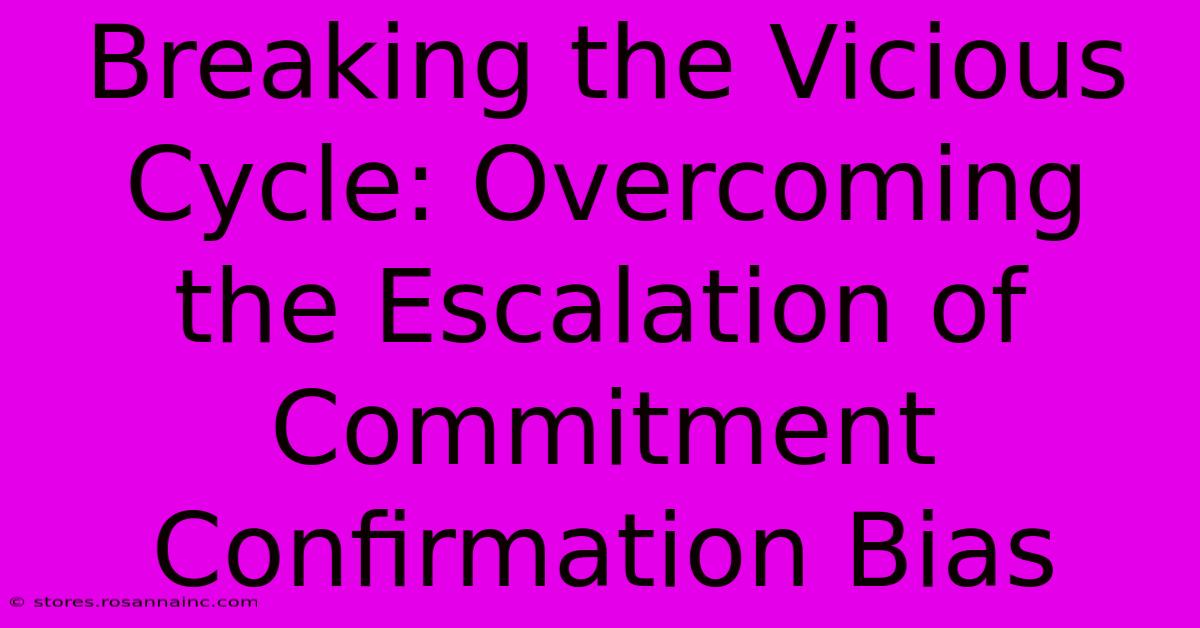Breaking The Vicious Cycle: Overcoming The Escalation Of Commitment Confirmation Bias

Table of Contents
Breaking the Vicious Cycle: Overcoming the Escalation of Commitment Confirmation Bias
We've all been there. You've invested time, money, or effort into a project, and despite mounting evidence it's failing, you keep pouring more resources into it. This isn't stubbornness; it's the insidious effect of escalation of commitment, fueled by confirmation bias. Understanding this psychological trap is the first step towards breaking free.
Understanding the Double Bind: Escalation of Commitment and Confirmation Bias
Escalation of commitment is the tendency to continue investing in a failing course of action, even when faced with negative feedback. It's a behavioral pattern that defies logic, leading to wasted resources and missed opportunities. Why do we do it? Often, it's because of confirmation bias.
Confirmation bias is our tendency to seek out and interpret information that confirms our pre-existing beliefs, while ignoring or downplaying information that contradicts them. When we've already invested heavily in a project, our confirmation bias kicks in, making us selectively focus on any positive signs (however small) while dismissing the negative ones (however significant). This creates a dangerous feedback loop: the more we invest, the more we seek to justify that investment, leading to further escalation.
Examples of Escalation of Commitment in Action
Consider these scenarios:
- Business: A company continues to fund a failing product despite declining sales and negative customer reviews, clinging to the belief that with more marketing, it will finally succeed.
- Personal Life: Someone stays in a toxic relationship despite repeated instances of abuse or disrespect, believing that their investment of time and emotion justifies staying, hoping things will "get better."
- Investing: An investor holds onto a losing stock, hoping it will eventually recover, refusing to accept the loss and sell.
In each case, the individual is trapped in a cycle fueled by escalation of commitment and confirmation bias. The initial investment creates a cognitive dissonance, a discomfort stemming from holding conflicting beliefs (the project is failing, yet I've invested so much in it). To reduce this dissonance, the individual unconsciously seeks confirming evidence, reinforcing the flawed decision.
Breaking Free from the Cycle: Strategies for Overcoming Escalation of Commitment
It's not easy to break free from this powerful psychological trap, but it's crucial to do so. Here are some effective strategies:
1. Seek Objective Feedback:
Actively solicit feedback from individuals unconnected to the project. These outside perspectives are less likely to be influenced by confirmation bias and can provide a more realistic assessment of the situation.
2. Set Clear Exit Strategies:
Before embarking on any significant project, establish predetermined criteria for abandoning the course of action if the results don't meet expectations. Having a pre-defined plan makes it easier to make the difficult decision to cut your losses.
3. Focus on Future Value, Not Sunk Costs:
The money or time already spent (sunk costs) is irrelevant to future decisions. The only factors that matter are the potential for future success and the opportunity cost of continuing to invest in the failing venture.
4. Embrace the "Second Opinion":
Don't hesitate to seek the perspective of an external expert or consultant to provide an objective evaluation. A fresh pair of eyes can often identify flaws or biases that have been missed.
5. Practice Mindfulness:
Being aware of your own cognitive biases is the first step to overcoming them. Practice mindfulness and self-reflection to identify when confirmation bias might be influencing your decisions. Challenge your own assumptions and actively seek out contradictory information.
6. Reframe Your Thinking:
Instead of viewing the initial investment as a justification for continuing, view it as a valuable learning experience. What can you learn from the failure that will help you make better decisions in the future?
Conclusion: Learning from Mistakes
Escalation of commitment and confirmation bias are powerful psychological forces that can lead to poor decision-making. By understanding these biases and implementing the strategies outlined above, you can break free from the vicious cycle and make more rational, effective decisions in both your professional and personal life. Remember, learning from mistakes is crucial for growth, and acknowledging failure is a sign of strength, not weakness. Breaking the cycle allows you to redirect resources towards more promising opportunities and ultimately, achieve greater success.

Thank you for visiting our website wich cover about Breaking The Vicious Cycle: Overcoming The Escalation Of Commitment Confirmation Bias. We hope the information provided has been useful to you. Feel free to contact us if you have any questions or need further assistance. See you next time and dont miss to bookmark.
Featured Posts
-
Ancient Celtic Symbols Decoded The Meaning Behind Intricate Knot Patterns
Feb 06, 2025
-
Motown Magic The Spirit That Drives The Ds Comeback
Feb 06, 2025
-
Worshiped Or Worshipped The Ultimate Guide To Proper Usage And Spiritually Enriching Worship
Feb 06, 2025
-
Indulge In Fontastic Delight Tt Chocolates Demibold Now At Your Fingertips
Feb 06, 2025
-
After School Paradise Uncover The Activities That Will Keep Your Child Thriving
Feb 06, 2025
